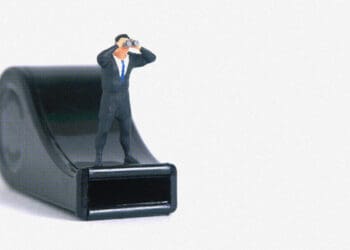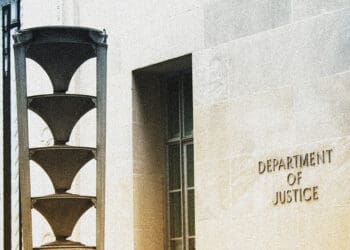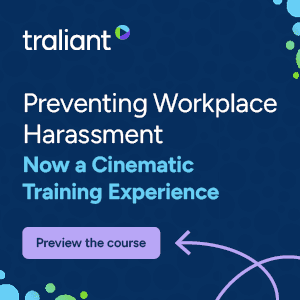with co-author Matthew LaGarde
Attorneys and compliance officers are corporate “gatekeepers” who are often in the best position to know of illegalities or wrongdoing in the workplace. Thus they are also in the best position to become whistleblowers and to bring such malfeasance to the attention of government officials. Unlike the average employee, however, who doesn’t necessarily have any legal, ethical or fiduciary constraints on would-be whistleblowing, employees who serve in a gatekeeper role are often limited in what they can say or do in the face of wrongdoing. Companies, courts and Congress have all struggled with this issue, and, unfortunately, the answers are not always clear.
Attorneys face the most difficult issues in deciding whether to blow the whistle, as they are subject to the ethical rules of the jurisdiction in which they practice. These ethical rules vary among the 50 states and the District of Columbia, but they are generally uniform regarding the obligation to protect client information and communications. It is universally accepted that attorneys are charged with protecting client confidences, even in the face of known wrongdoing, and have fiduciary obligations to their clients that courts have long recognized and enforced. These bedrock principles seem to undermine the very idea that an in-house attorney could blow the whistle on its corporate client without running afoul of ethical obligations.
But such obligations have never been absolute, which is what creates such an uncertain landscape for employers and employees alike. While some states provide an exception that permits an attorney to reveal client information “to establish a claim or defense on behalf of the attorney in a controversy between the attorney and the client,” [see Maryland Rules of Professional Conduct 1.6(b)(5)], others, including attorney-dense jurisdictions such as New York and Washington, D.C., do not. Similarly, while most jurisdictions allow disclosure of information related to an ongoing crime or fraud that involves the use of the lawyer’s services, there remains a strong professional ethos in favor of nondisclosure, and courts in many jurisdictions have emphasized that any such disclosures should be as limited as possible. [See, e.g., Fundamental Admin. Servs., LLC v. Anderson, 18 F. Supp. 3d 680, 683–84 (D. Md. 2014) (chastising attorney for bringing a wrongful termination claim against former employer without taking sufficient protective measures)].
Congress attempted to respect the principle of nondisclosure by attorneys when it passed the well-known corporate whistleblower protection and reward provisions contained in the Sarbanes-Oxley Act of 2002 (SOX) and the Dodd-Frank Wall Street Reform and Consumer Protection Act (Dodd-Frank). While Congress did establish some whistleblower protections and rewards for attorneys who report wrongdoing under those statutes, it did so only in narrow circumstances.
Under rules promulgated by the U.S. Securities and Exchange Commission (SEC) pursuant to SOX, for example, attorneys have a prescribed chain of reporting. Attorneys are required to report material violations of securities rules and regulations to their company’s chief legal officer and possibly to the company’s board of directors. While attorneys are not required to report to the SEC if the company does not act on their internal reports, they may make such a report to prevent fraud or to prevent or rectify a substantial injury to the investors. Importantly, these rules serve only as a baseline of requirements placed on attorneys, who are still subject to the ethical requirements set forth in the rules of professional conduct in the jurisdiction in which they practice, some of which expressly forbid attorneys to disclose confidential information under the circumstances described above.
This point is critical for attorneys who seek whistleblower rewards under Dodd-Frank because in order to be eligible for such an award, the whistleblower must have submitted “original information” to the Commission. The definition of “original information” excludes any information that is protected by state ethical rules regarding revealing confidential information or information adverse to a former client. Although most jurisdictions permit an attorney to reveal attorney-client privileged communications under the crime/fraud exception, the specific bounds of that exception are complex and jurisdiction-specific. In general, while attorneys are not excluded from receiving a whistleblower award, the limitations on such awards are considerable based on longstanding fiduciary and ethical rules related to client confidences and conflicts of interest.
While an attorney’s eligibility for an SEC whistleblower reward is not entirely clear, the Supreme Court did make clear in 2014 that the anti-retaliation protections in SOX do extend to employees of contractors and subcontractors of public companies, including outside lawyers. [Lawson v. FMR, LLC, 124 S.Ct. 1158, 188 L.Ed.2d 158 (2014).] The Department of Labor has separately held that SOX’s protections extend to in-house counsel as well. [Jordan v. Spring Nextel Corp., ARB Case No. 06-105, ALJ Case No. 2006-SOX-041 (DOL Admin. Rev. Bd. Sept. 30, 2009).] And because Dodd-Frank protections arguably extend, at least in jurisdictions other than the Fifth Circuit, to disclosures required or protected by SOX, attorney whistleblowers who experience retaliation may also seek protection under Dodd-Frank.
Like attorneys, compliance officers are also uniquely positioned to observe and report violations of law within an organization. Indeed, their primary function is to receive, identify and address information regarding conduct that is potentially unethical, unlawful or even criminal. Unlike attorneys, however, compliance officials do not operate under ethical constraints related to professional conduct or legal privilege. That said, some courts have taken the view that due to the very nature of their positions, compliance personnel must “step outside” that function in order to engage in legally protected activity. [See, e.g., Riddle v. First Tennessee Bank, No. 3:10-CV-0578, 2011 WL 4348298 (M.D. Tenn. Sept. 16, 2011).]
The Department of Labor, however, has ruled that compliance personnel are protected by the anti-retaliation provisions of SOX, noting that the statute “does not indicate that an employee’s report or complaint about a potential violation must involve actions outside the complainant’s assigned duties.” [Robinson v. Morgan-Stanley, ARB Case No. 07–070, ALJ Case No. 2005-SOX-044 (DOL Admin. Rev. Bd. Jan. 10, 2010).] Similarly, although a majority of courts had long required compliance personnel to “step outside” their role to engage in protected activity under the False Claims Act (FCA), a recent amendment to the statute under the Fraud Enforcement and Recovery Act of 2009 appears to have obviated that requirement.
Like attorneys, compliance officers are subject to significant eligibility exclusions for the SEC Whistleblower Program, primarily through the limits on “independent knowledge or independent analysis.” In general, the SEC will not permit compliance officers or auditors to report information that they learned from others or during the course of their compliance and/or auditing duties. However, the SEC does permit such disclosures to the extent they are necessary to prevent substantial injury to the financial interest or property of the company or investors, where the company is engaging in conduct that will impede investigation of wrongdoing, or when 120 days have passed since the compliance official reported the information to company officers or it appears these officers were already aware of the issue.
Employers facing whistleblower claims brought by current or former attorneys will invoke numerous defenses to avoid disclosure of sensitive information provided in confidence to these employees. While some such claims may be barred by an attorney’s duty of confidentiality—particularly those brought by attorneys in jurisdictions like New York, which do not provide any broad exceptions allowing disclosure of information “to establish a claim or defense on behalf of the lawyer” — many jurisdictions permit attorneys to proceed with such a claim.
In those jurisdictions, many of the substantive defenses available to employers who are subjected to such claims track the issues we describe above facing whistleblowers attempting to bring such claims. For instance, where an attorney has retained or relied on confidential documents in the course of blowing the whistle on misconduct, the attorney’s conduct may itself provide the employer with a legitimate, nonretaliatory grounds for termination. [See, e.g., JDS Uniphase Corp. v. Jennings, 473 F. Supp. 2d 697, 704 (E.D. Va. 2007).] Moreover, as described above, jurisdictions remain that require attorneys and compliance officers to have taken some action outside of their normal job responsibilities in order to pursue SOX or FCA whistleblower claims.
While few definitive rules exist in this area, one thing is abundantly clear: Pursuing whistleblower claims can be a treacherous task for attorneys and compliance officers. It remains a difficult and idiosyncratic area of law without many bright-line rules. Employees with meritorious claims may be proscribed from pursuing them in order to preserve the universally held principle that a client should be able trust that an attorney will keep its confidences. In a similar “micro injustice” to realize a “macro end,” compliance officers and attorneys — the very corporate “gatekeepers” who are often in the best position to know of illegalities or wrongdoing in the workplace — are often prohibited from even informing the government about that wrongdoing. In such a complex area of law, it is critical that employees and employers consult with experienced counsel regarding their obligations and prohibitions.










